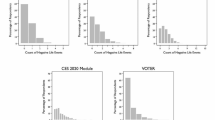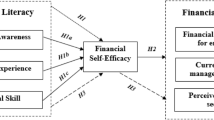Abstract
This study examines whether financial literacy can help to reduce anxiety about life in old age. We hypothesized that financially literate people are more able to earn income and accumulate assets, leading them to have a less anxious life in old age. On the other hand, less financially literate people rely more on social security to secure themselves in the old age as they are not able to accumulate sufficient assets. By using US survey data, we provide evidence that assets significantly reduce anxiety about life in old age only for people who are more financially literate. For less financially literate people, social security plays an important role in reducing anxiety about life in old age. Besides these, having a child and doing regular exercise also reduced anxiety for all respondents but marital status reduced anxiety in respondents over 40 years of age. The results of our study are robust to measurement of financial literacy and endogeneity problems.
Similar content being viewed by others
References
Al-Tamimi, H. A. H., & Kalli, A. A. B. (2009). Financial literacy and investment decisions of UAE investors. The Journal of Risk Finance, 10(5), 500–516.
Alessie, R., Van Rooij, M., & Lusardi, A. (2011). Financial literacy and retirement preparation in the Netherlands. Journal of Pension Economics and Finance, 10(4), 527–546.
American Psychological Association (2016). Anxiety. http://www.apa.org/topics/anxiety/. Accessed 13 May 2017.
Anxiety and Depression Association of America (2017). Exercise for stress and anxiety. https://adaa.org/living-with-anxiety/managing-anxiety/exercise-stress-and-anxiety. Accessed 6 August 2017.
Atrostic, B. K., Bates, N., Burt, G., & Silberstein, A. (2001). Nonresponse in U.S. government household surveys: consistent measures, recent trends, and new insights. Journal of Official Statistics, 17(2), 209–226.
Banks, J. (2010). Cognitive function, financial literacy and financial outcomes at older ages: Introduction. The Economic Journal, 120(548), F357–F362.
Bartlett, J. E., Kotrlik, J. W., & Higgins, C. C. (2001). Organizational research: determining appropriate sample size in survey research. Information Technology, Learning, and Performance, 19(1), 43–50.
Behrman, J. R., Mitchell, O. S., Soo, C., & Bravo, D. (2010). Financial literacy, schooling and wealth accumulation. NBER Working Paper 16452. Cambridge, MA: National Bureau of Economic Research, Inc.
Bennett, J. S., Boyle, P. A., James, B. D., & Bennett, D. A. (2012). Correlates of health and financial literacy in older adults without dementia. BMC Geriatrics, 1, 30 https://bmcgeriatr.biomedcentral.com/articles/10.1186/1471-2318-12-30.
Bernheim, D. (1998). Financial illiteracy, education and retirement saving. In O. Mitchell, S. Schieber (Eds.), Living with defined contribution pensions. (pp. 38–68). Philadelphia: University of Pennsylvania Press.
Bernheim, D., & Garrett, D. M. (2003). The effects of financial education in the workplace: evidence from a survey of households. Journal of Public Economics, 87(7−8), 1487–1519.
Bland, R. C., Newman, S. C., & Orn, H. (1998). Period prevalence of psychiatric disorders in Edmonton. Acta Psychiatrica Scandinavia, 77(Suppl 338), 33–42.
Butricia, B. A., Iams, H. M., & Smith, K. E. (2005). The changing impact of social security on retirement income in the United States. Social Security Bulletin, 65(3), 1–13.
Calvet, L., Campbell, J., & Sodini, P. (2009). Measuring the financial sophistication of households. American Economic Review, 99, 393–398.
Carta, M. G., Carpiniello, B., Morosini, P. L., & Rudas, N. (1991). Prevalence of mental disorders in Sardinia: a community study in an inland mining district. Psychological Medicine, 21, 1061–1071.
De Moor, M. H. M., Beem, A. L., Stubbe, J. H., Boomsma, D. I., & De Geus, E. J. C. (2006). Regular exercise, anxiety, depression and personality: a population-based study. Preventive Medicine, 42(4), 273–279.
Duffy, B., Smith, K., Terhanian, G., & Bremer, J. (2005). Comparing data from online and face-to-face surveys. International Journal of Market Research, 47(6), 615–639.
Ettlinger, M. & Chapman, J. (2005). Social security and the income of the elderly. EPI issue brief, No. 6, Economic Policy Unit, Washington, D.C., USA.
Fichter, M. M., Narrow, W. E., Roper, M. T., Rehm, J., Elton, M., & Rae, D. S., et al. (1996). Prevalence of mental illness in Germany and the United States: comparison of the Upper Bavarian Study and the Epidemiologic Catchment Area Program. Journal of Nervous and Mental Disease, 184(10), 598–606.
Goyder, J. (1986). Surveys on surveys: limitations and potentialities. Public Opinion Quarterly, 50(1), 27–41.
Heinrichs, N., Rapee, R. M., Alden, L. A., Bögels, S., Hofmann, S. G., & Oh, K. J., et al. (2006). Cultural differences in perceived social norms and social anxiety. Behavioral Research and Therapy, 44(8), 1187–1197.
Hofmann, S. G., Asnaani, A., & Hinton, D. E. (2010). Cultural aspects in social anxiety and social anxiety disorder. Depression and Anxiety, 27(12), 1117–1127.
Hung, A., Parker, A. M., & Yoong, J. (2009). Defining and measuring financial literacy. Working Paper, No. WR-708. Labour and Population Working Paper Series, Rand Corporation.
Institute of Social and Economic Research (2012). Preference parameters study. Suita, Japan: Osaka University.
Jorm, A. F. (2000). Does old age reduce the risk of anxiety and depression? A review of epidemiological studies across the adult life span. Psychological Medicine, 30(1), 11–22.
Kadoya, Y. (2016). What makes people anxious about life after the age of 65? Evidence from international survey research in Japan, the United States, China, and India. Review of Economics of the Household, 14(2), 443–461.
Kadoya, Y., & Khan, M. S. R. (2017). Can financial literacy reduce anxiety about life at the old age? Journal of Risk Research. https://doi.org/10.1080/13669877.2017.1313760.
Kalton, G., Kasprzyk, D., & McMillen, D. B. (1989). Non-sampling errors in panel surveys. In D. Kasprzyk, G. J. Duncan, G. Kalton, & M. P. Singh (Eds.), Panel surveys (pp. 249–270). New York: Wiley.
Kikutani, M., Ikemoto, M., Russell, J., & Roberson, D. (2016). Cultural influences on the structure of emotion: an investigation of emotional situations described by individuals from Cambodia, Japan, UK and US. International. Journal of Applied Psychology, 6(1), 20–26.
Kitayama, S., Markus, H. R., & Kurokawa, M. (2000). Culture, emotion, and well-being: good feelings in Japan and the United States. Cognition and Emotion, 14(1), 93–124.
Kreuter, F., Presser, S., & Tourangeau, R. (2008). Social desirability bias in CATI, IVR, and Web surveys. Public Opinion Quarterly, 72(5), 847–865.
Lusardi, A., & Mitchell, O. S. (2007). Financial literacy and retirement preparedness: evidence and implications for financial education. Business Economics, 42(1), 35–44.
Lusardi, A., & Mitchell, O. S. (2008). Planning and financial literacy: how do women fare? American Economic Review, 98(2), 413–417.
Lusardi, A., & Mitchell, O. S. (2011a). Financial literacy around the world: an overview. Journal of Pension Economics and Finance, 10(4), 497–508.
Lusardi, A., & Mitchell, O. S. (2011b). Financial literacy and retirement planning in the United States. Journal of Pension Economics and Finance, 10(04), 509–525.
Lusardi, A., & Mitchell, O. S. (2014). The economic importance of financial literacy: theory and evidence. Journal of Economic Literature, 52(1), 5–44.
Lusardi, A., Mitchell, O. S., & Curto, V. (2010). Financial literacy among the young: evidence and implications for consumer policy. The Journal of Consumer Affairs, 44(2), 358–380.
Lusardi, A., Mitchell, O. S., & Curto, V. (2014). Financial literacy and financial sophistication in the older population. Journal of Pension Economics and Finance, 13(4), 347–366.
Mandell, L. (2007). Financial literacy of high school students. In J. J. Xiao (Ed.), Handbook of consumer finance research (pp. 163–184). New York: Springer.
McCarthy, J. S., & Beckler, D. G. (1999). An analysis of the relationship between survey burden and non-response: “If we bother them more, are they less cooperative?” Paper presented at the International Conference on Survey Non-response, Portland, Oregon, USA.
Mochcovitch, M. D., Deslandes, A. C., Freire, R. C., Garcia, R. F., & Nardi, A. E. (2016). The effects of regular physical activity on anxiety symptoms in healthy older adults: a systematic review. Revista Brasileira Délelőtt Psiquiatria, 38(3), 255–261.
Moore, D. (2003). Survey of financial literacy in Washington State: knowledge, behavior, attitudes and experiences. Technical Report No. 03-39. Washington, D.C.: Social and Economic Sciences Research Center, Washington State University.
Monticone, C. (2010). How much does wealth matter in the acquisition of financial literacy? The Journal of Consumer Affairs, 44(2), 403–422.
Norasakkunkit, V., & Kalick, S. M. (2009). Experimentally detecting how cultural differences on social anxiety measures misrepresent cultural differences in emotional well-being. Journal of Happiness Studies, 10(3), 313–327.
Oakley, D., & Kenneally, K. (2015). Retirement security 2015: Roadmap for policy makers Americans’ views of the retirement crisis. Washington, DC: National Institute on Retirement Security.
Okazaki, S. (1997). Sources of ethnic differences between Asian-American and White American college students on measures of depression and social anxiety. Journal of Abnormal Psychology, 106(1), 52–60.
Pinquart, M., & Sörensen, S. (2000). Influences of socioeconomic status, social network, and competence on subjective well-being in later life: a meta-analysis. Psychology and Aging, 15(2), 187–224.
Pinquart, M., & Sörensen, S. (2006). Gender differences in caregiver stressors, social resources, and health: an updated meta-analysis. Journal of Gerontology: Psychology Science, 61B(1), 33–45.
Sekita, S. (2011). Financial literacy and retirement planning in Japan. Journal of Pension Economics and Finance, 10(4), 637–656.
Sekita, S. (2013). Financial literacy and wealth accumulation: evidence from Japan. Discussion Paper No. 2013-01. Kyoto: Graduate School of Economics, Kyoto Sangyo University.
Sinoff, G., Ore, L., Zlotogorsky, D., & Tamir, A. (1999). A short anxiety screening test – a brief instrument for detecting anxiety in the elderly. International Journal of Geriatric Psychiatry, 14(12), 1062–1071.
Stango, V., & Zinman, J. (2009). Exponential growth bias and household finance. Journal of Finance, 64(6), 2807–2849.
Van Rooij, M., Lusardi, A., & Alessie, R. (2011). Financial literacy and stock market participation. Journal of Financial Economics, 101(2), 449–472.
Van Rooij, M., Lusardi, A., & Alessie, R. (2012). Financial literacy, retirement planning and household wealth. The Economic Journal, 122(560), 449–478.
Weissman, M. M., & Myers, J. K. (1980). Psychiatric disorders in a U.S. community: the application of research diagnostic criteria to a resurveyed community sample. Acta Psychiatrica Scandinavia, 62(2), 99–111.
Wu, Z., Schimmele, C. M., & Chappell, N. (2012). Aging and late-life depression. Journal of Aging and Health, 24(1), 3–28.
Acknowledgements
This research used micro data from the Preference Parameters Study of Osaka University’s 21st Century COE Program “Behavioral Macrodynamics Based on Surveys and Experiments” and its Global COE project “Human Behavior and Socioeconomic Dynamics.” We acknowledge the program/project’s contributors: Yoshiro Tsutsui, Fumio Ohtake, and Shinsuke Ikeda. The authors appreciate for the valuable comments of anonymouse referees.
Funding
This work was supported by JSPS KAKENHI Grant Numbers JP15KK0083 and JP15K17075; RISTEX JST; and a grant-in-aid from Zengin Foundation for Studies on Economics and Finance.
Author information
Authors and Affiliations
Corresponding author
Ethics declarations
Conflict of interest
The authors declare that they have no conflict of interest.
Rights and permissions
About this article
Cite this article
Kadoya, Y., Khan, M.S.R., Hamada, T. et al. Financial literacy and anxiety about life in old age: evidence from the USA. Rev Econ Household 16, 859–878 (2018). https://doi.org/10.1007/s11150-017-9401-1
Received:
Accepted:
Published:
Issue Date:
DOI: https://doi.org/10.1007/s11150-017-9401-1




